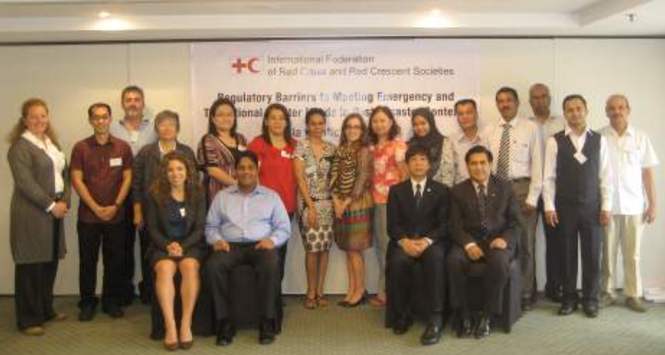
National Red Cross Societies from Nepal, the Philippines, Sri Lanka and Vietnam came together with other humanitarian partners in Kuala Lumpur on 17-18 July to discuss regulatory barriers to the provision of emergency and transitional shelters after disasters. The workshop was convened by the International Federation of Red Cross Red Crescent Societies’ (IFRC) Disaster Law Programme and Shelter and Settlements Department and aimed both to raise awareness of the issue and to solicit ideas from National Societies on how to overcome these barriers.
The Secretary Generals from the Vietnam, Sri Lanka and Nepal Red Cross Societies were joined by their legal and disaster management colleagues to discuss the findings of a draft desk study recently drafted by the IFRC. This study examines existing laws, regulations and procedures relevant to shelter in six selected countries of the Asia Pacific region, including the four countries present at the workshop as well as Pakistan and Indonesia.
This meeting was the first to be convened within the framework of a global project following the request of Resolution 7 of the 31st International Conference in November 2011. The aim of the project is to work with National Societies, governments and other partners to find creative and practical solutions to common regulatory barriers to providing timely and equitable emergency and transitional shelter after disasters.
Soomsook Boonyabancha from the Asian Coalition for Housing Rights in Thailand reminded participants of the importance of community-driven approaches to shelter. When communities can be their own ‘architects’ in developing shelter solutions, “these processes can be powerful development opportunities”, she said, “we need to encourage people to work together as a community to overcome regulatory barriers.”
Laxman Perera from UN Habitat in Sri Lanka emphasized four key barriers to the provision of shelter from the point of view of affected persons: inappropriate land use planification, lack of access to land, insecurity of tenure, and ineffective land administration. “In many disaster situations”, he stated, “there has been a weak enforcement of land use plans at the local level, or plans can be outdated or invalid. This can cause serious delays in accessing land, opportunistic land grabbing, and forced relocation”.
The IFRC is finalising its draft desk study in light of the suggestions received and will soon move into the second phase of the project: conducting with National Societies in-country regulatory audits, allowing for a complete review of existing laws and procedure relevant to post-disaster-shelter.